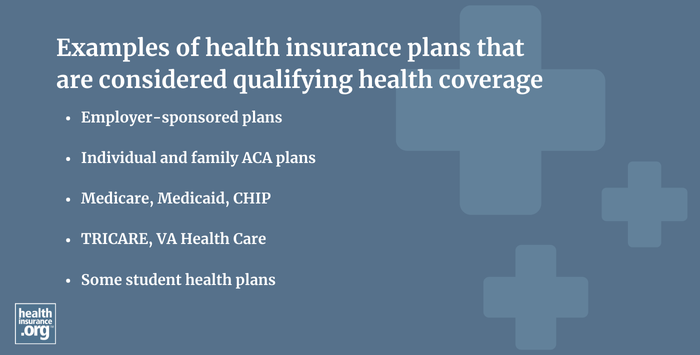
What is qualifying health coverage?
Qualifying coverage refers to any health insurance plan that is considered minimum essential coverage under the Affordable Care Act. This includes individual or employer-sponsored comprehensive group health coverage (and such coverage continued via COBRA), as well as Medicare, Medicaid/CHIP, and Veterans Administration coverage.1
Qualifying coverage does not necessarily have to be compliant with the ACA. Grandmothered and grandfathered plans in the individual and small group market do not have to comply with most of the ACA's provisions, but they're still considered minimum essential coverage, or qualifying coverage. And "skinny" employer-sponsored plans are considered minimum essential coverage simply because they're offered by an employer, but are not comprehensive major medical coverage.2
Qualifying coverage does NOT include health benefits for a specific illness, such as cancer, or limited need such as no-fault automobile, disability coverage, dental coverage or other limited-coverage plans. It also does not include short-term health insurance plans.
Indian Health Services is not considered qualifying coverage on its own, but American Indians and Alaska Natives have access to year-round enrollment in the exchange, and depending on income, many American Indians and Alaska Natives also have access to exchange plans with no cost-sharing.
Is there a penalty if I don't have qualifying health coverage?
No, there is no longer a federal penalty for not having qualifying health coverage. The penalty was eliminated after 2018. However, DC and four states impose their own penalties if residents don't maintain qualifying health coverage.
Although there is no longer a federal penalty for not having qualifying coverage, many qualifying life events only trigger a special enrollment period if the person had continuous prior qualifying coverage. Learn more about how special enrollment periods work.
Footnotes
- "Qualifying health coverage" HealthCare.gov. Accessed Nov. 26, 2024 ⤶
- "Guide to MEC plans" PeopleKeep. April 24, 2024 ⤶
